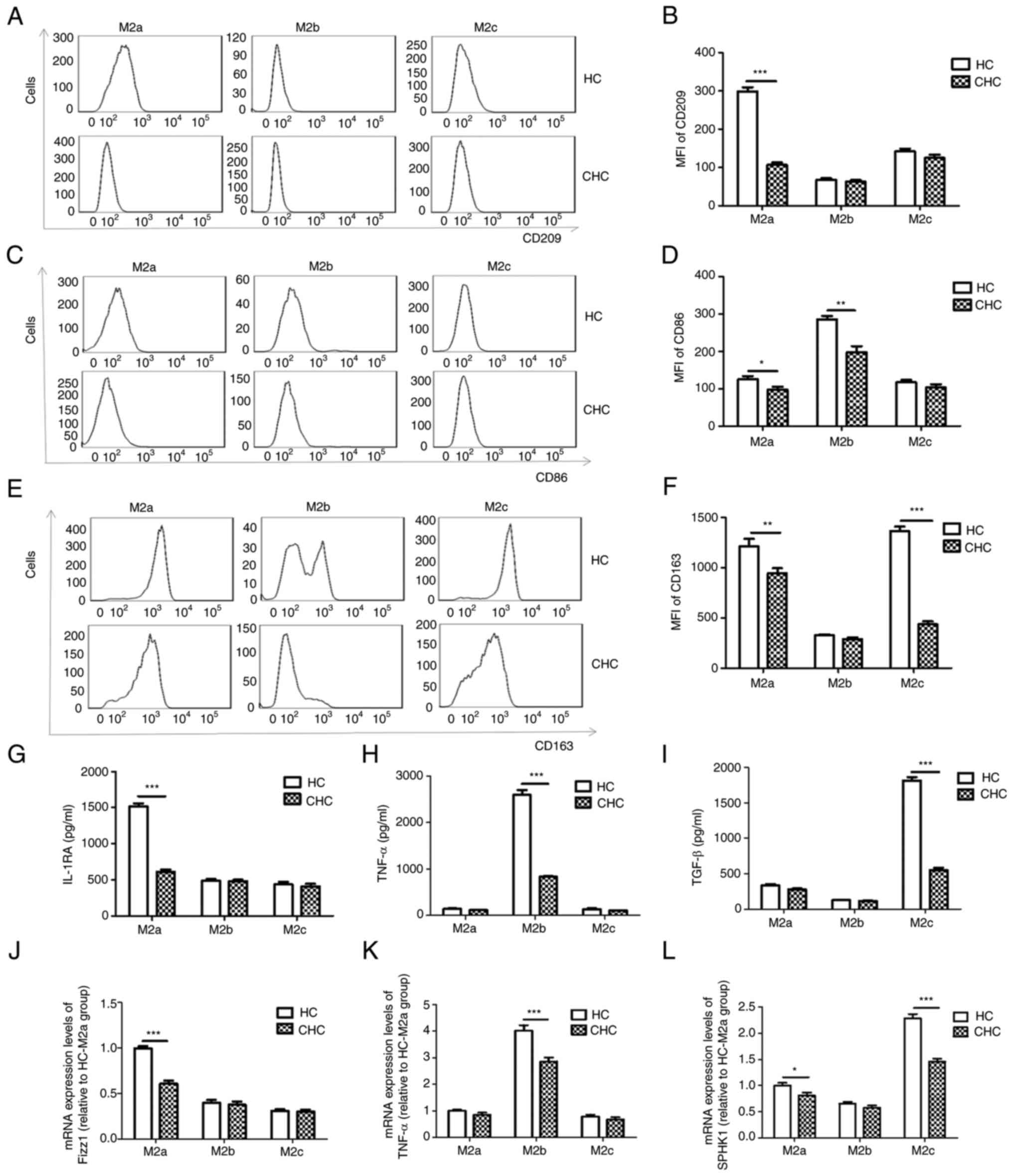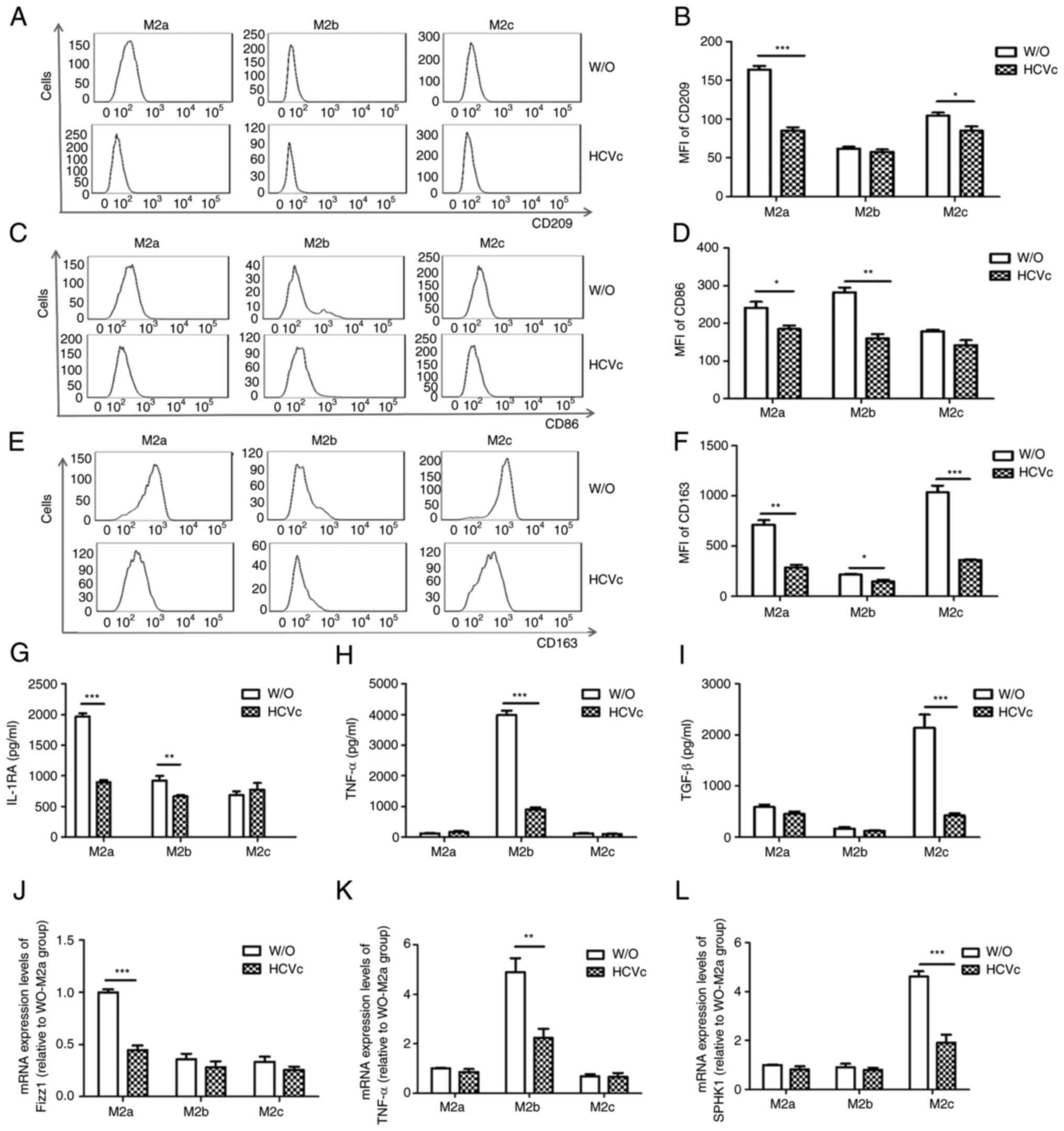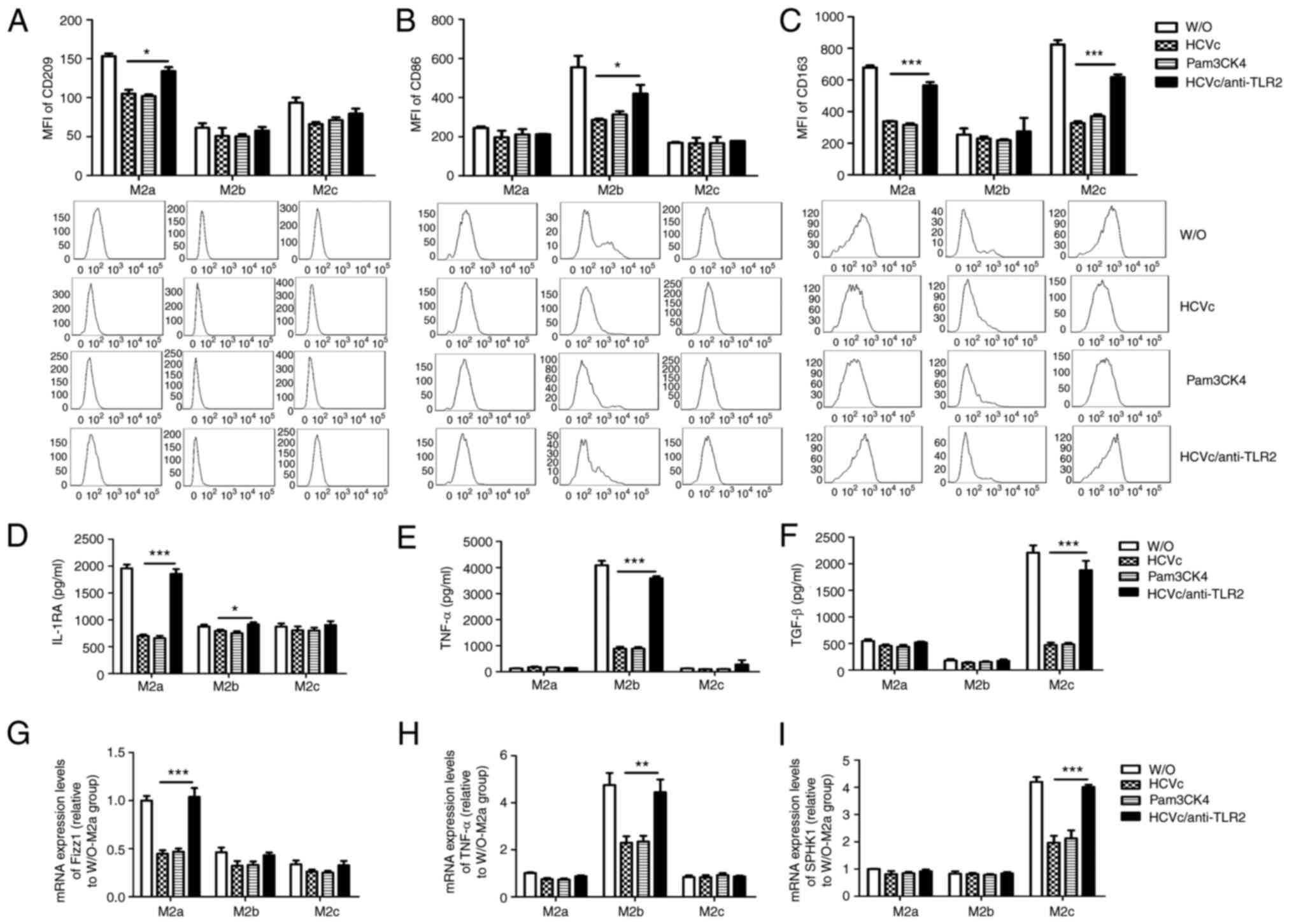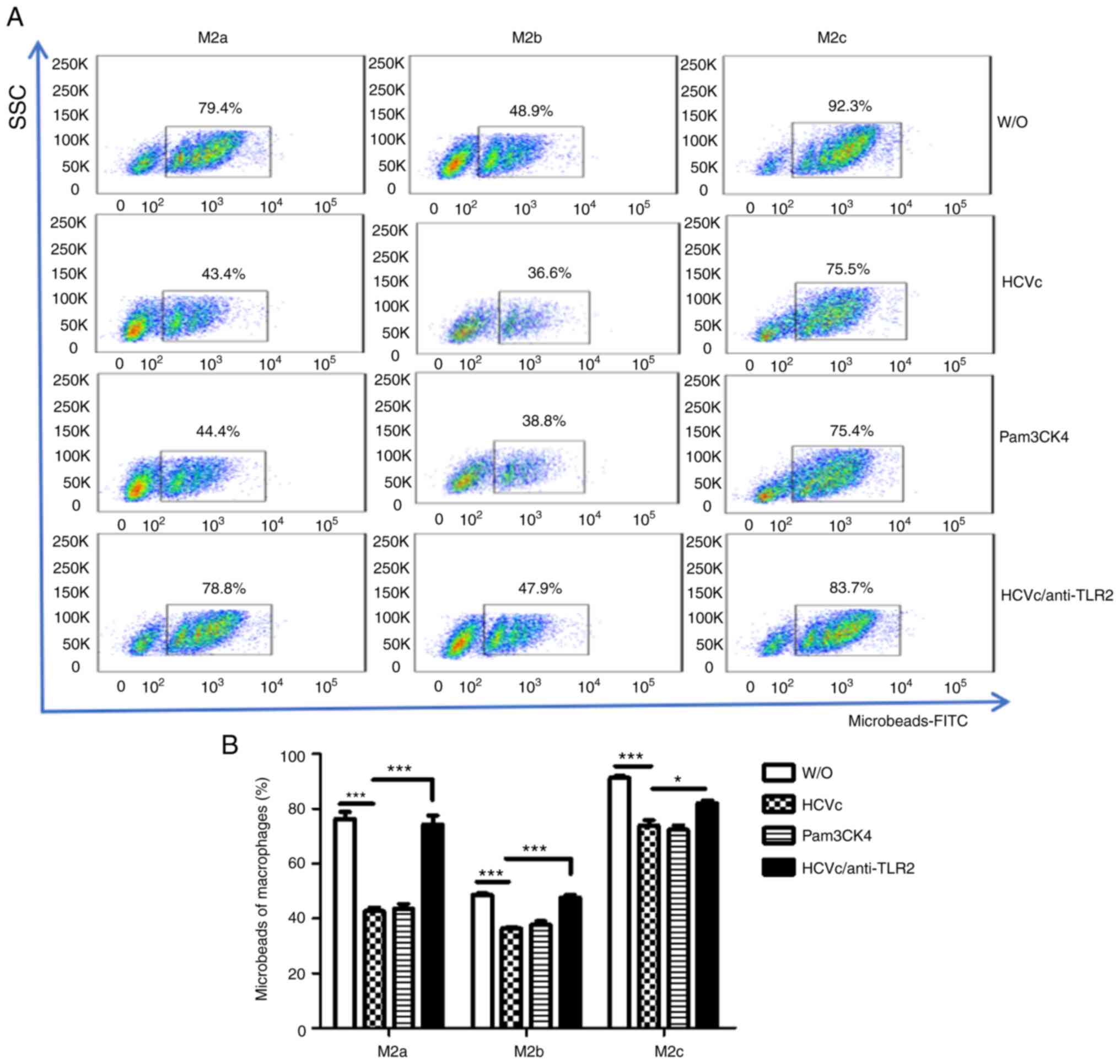|
1
|
European Association for the Study of the
Liver, Electronic address: simpleeasloffice@easloffice.eu,
Clinical Practice Guidelines Panel. Chair, EASL Governing Board
representative, Panel members: EASL recommendations on treatment of
hepatitis C: Final update of the series. J Hepatol. 73:1170–1218.
2020.PubMed/NCBI View Article : Google Scholar
|
|
2
|
Ciesek S and Manns MP: Hepatitis in 2010:
The dawn of a new era in HCV therapy. Nat Rev Gastroenterol
Hepatol. 8:69–71. 2011.PubMed/NCBI View Article : Google Scholar
|
|
3
|
Marascio N, Quirino A, Barreca GS, Galati
L, Costa C, Pisani V, Mazzitelli M, Matera G, Liberto MC, Focà A
and Torti C: . Discussion on critical points for a tailored therapy
to cure hepatitis C virus infection. Clin Mol Hepatol. 25:30–36.
2019.PubMed/NCBI View Article : Google Scholar
|
|
4
|
Wijaya RS, Read SA, Selvamani SP, Schibeci
S, Azardaryany MK, Ong A, van der Poorten D, Lin R, Douglas MW,
George J and Ahlenstiel G: Hepatitis C virus (HCV) eradication with
interferon-free direct-acting antiviral-based therapy results in
KLRG1+ HCV-specific memory natural killer cells. J Infect Dis.
223:1183–1195. 2021.PubMed/NCBI View Article : Google Scholar
|
|
5
|
Sung PS and Shin EC: Immunological
mechanisms for hepatocellular carcinoma risk after direct-acting
antiviral treatment of hepatitis C virus infection. J Clin Med.
10(221)2021.PubMed/NCBI View Article : Google Scholar
|
|
6
|
Lauer GM: Immune responses to hepatitis C
virus (HCV) infection and the prospects for an effective HCV
vaccine or immunotherapies. J Infect Dis. 207 (Suppl 1):S7–S12.
2013.PubMed/NCBI View Article : Google Scholar
|
|
7
|
Mohammadzadeh S, Roohvand F, Ehsani P,
Salmanian AH and Ajdary S: Canola oilseed- and Escherichia coli-
derived hepatitis C virus (HCV) core proteins adjuvanted with oil
bodies, induced robust Th1-oriented immune responses in immunized
mice. APMIS. 128:593–602. 2020.PubMed/NCBI View Article : Google Scholar
|
|
8
|
Guilliams M, Mildner A and Yona S:
Developmental and functional heterogeneity of monocytes. Immunity.
49:595–613. 2018.PubMed/NCBI View Article : Google Scholar
|
|
9
|
Cao X, Yakala GK, van den Hil FE, Cochrane
A, Mummery CL and Orlova VV: Differentiation and functional
comparison of monocytes and macrophages from hiPSCs with peripheral
blood derivatives. Stem Cell Reports. 12:1282–1297. 2019.PubMed/NCBI View Article : Google Scholar
|
|
10
|
Boyette LB, Macedo C, Hadi K, Elinoff BD,
Walters JT, Ramaswami B, Chalasani G, Taboas JM, Lakkis FG and
Metes DM: Phenotype, function, and differentiation potential of
human monocyte subsets. PLoS One. 12(e0176460)2017.PubMed/NCBI View Article : Google Scholar
|
|
11
|
Rios FJ, Touyz RM and Montezano AC:
Isolation and differentiation of human macrophages. Methods Mol
Biol. 1527:311–320. 2017.PubMed/NCBI View Article : Google Scholar
|
|
12
|
Koh YC, Yang GL, Lai CS, Weerawatanakorn M
and Pan MH: Chemopreventive effects of phytochemicals and medicines
on M1/M2 polarized macrophage role in inflammation-related
diseases. Int J Mol Sci. 19(2208)2018.PubMed/NCBI View Article : Google Scholar
|
|
13
|
Yunna C, Mengru H, Lei W and Weidong C:
Macrophage M1/M2 polarization. Eur J Pharmacol.
877(173090)2020.PubMed/NCBI View Article : Google Scholar
|
|
14
|
Mily A, Kalsum S, Loreti MG, Rekha RS,
Muvva JR, Lourda M and Brighenti S: Polarization of M1 and M2 human
monocyte-derived cells and analysis with flow cytometry upon
mycobacterium tuberculosis infection. J Vis Exp. 2020.PubMed/NCBI View
Article : Google Scholar
|
|
15
|
Martinez FO, Sica A, Mantovani A and
Locati M: Macrophage activation and polarization. Front Biosci.
13:453–461. 2008.PubMed/NCBI View
Article : Google Scholar
|
|
16
|
Zhang Q, Wang Y, Zhai N, Song H, Li H,
Yang Y, Li T, Guo X, Chi B, Niu J, et al: HCV core protein inhibits
polarization and activity of both M1 and M2 macrophages through the
TLR2 signaling pathway. Sci Rep. 6(36160)2016.PubMed/NCBI View Article : Google Scholar
|
|
17
|
Chinese Society of Hepatology, Chinese
Medical Association, Wei L, Chinese Society of Infectious Diseases,
Chinese Medical Association, Hou JL. The guideline of prevention
and treatment for hepatitis C: A 2015 update. Zhonghua Gan Zang
Bing Za Zhi. 23:906–923. 2015.PubMed/NCBI View Article : Google Scholar : (In Chinese).
|
|
18
|
Ohlsson SM, Linge CP, Gullstrand B, Lood
C, Johansson A, Ohlsson S, Lundqvist A, Bengtsson AA, Carlsson F
and Hellmark T: Serum from patients with systemic vasculitis
induces alternatively activated macrophage M2c polarization. Clin
Immunol. 152:10–19. 2014.PubMed/NCBI View Article : Google Scholar
|
|
19
|
Livak KJ and Schmittgen TD: Analysis of
relative gene expression data using real-time quantitative PCR and
the 2(-Delta Delta C(T)) method. Methods. 25:402–408.
2001.PubMed/NCBI View Article : Google Scholar
|
|
20
|
Graham DB, Stephenson LM, Lam SK, Brim K,
Lee HM, Bautista J, Gilfillan S, Akilesh S, Fujikawa K and Swat W:
An ITAM-signaling pathway controls cross-presentation of
particulate but not soluble antigens in dendritic cells. J Exp Med.
204:2889–2897. 2007.PubMed/NCBI View Article : Google Scholar
|
|
21
|
Ablin J, Verbovetski I, Trahtemberg U,
Metzger S and Mevorach D: Quinidine and procainamide inhibit murine
macrophage uptake of apoptotic and necrotic cells: A novel
contributing mechanism of drug-induced-lupus. Apoptosis.
10:1009–1018. 2005.PubMed/NCBI View Article : Google Scholar
|
|
22
|
Tu Z, Hamalainen-Laanaya HK, Nishitani C,
Kuroki Y, Crispe IN and Orloff MS: HCV core and NS3 proteins
manipulate human blood-derived dendritic cell development and
promote Th 17 differentiation. Int Immunol. 24:97–106.
2012.PubMed/NCBI View Article : Google Scholar
|
|
23
|
Oishi Y and Manabe I: Macrophages in
inflammation, repair and regeneration. Int Immunol. 30:511–528.
2018.PubMed/NCBI View Article : Google Scholar
|
|
24
|
Wolf AA, Yáñez A, Barman PK and Goodridge
HS: The ontogeny of monocyte subsets. Front Immunol.
10(1642)2019.PubMed/NCBI View Article : Google Scholar
|
|
25
|
Fletcher P, Hamilton RF Jr, Rhoderick JF,
Pestka JJ and Holian A: Docosahexaenoic acid impacts macrophage
phenotype subsets and phagolysosomal membrane permeability with
particle exposure. J Toxicol Environ Health A. 84:152–172.
2021.PubMed/NCBI View Article : Google Scholar
|
|
26
|
Rhee I: Diverse macrophages polarization
in tumor microenvironment. Arch Pharm Res. 39:1588–1596.
2016.PubMed/NCBI View Article : Google Scholar
|
|
27
|
Ohama H, Asai A, Ito I, Suzuki S,
Kobayashi M, Higuchi K and Suzuki F: M2b macrophage elimination and
improved resistance of mice with chronic alcohol consumption to
opportunistic infections. Am J Pathol. 185:420–431. 2015.PubMed/NCBI View Article : Google Scholar
|
|
28
|
Carta T, Razzuoli E, Fruscione F, Zinellu
S, Meloni D, Anfossi A, Chessa B, Dei Giudici S, Graham SP, Oggiano
A and Franzoni G: Comparative phenotypic and functional analyses of
the effects of IL-10 or TGF-β on porcine macrophages. Animals
(Basel). 11(1098)2021.PubMed/NCBI View Article : Google Scholar
|
|
29
|
Lurier EB, Dalton D, Dampier W, Raman P,
Nassiri S, Ferraro NM, Rajagopalan R, Sarmady M and Spiller KL:
Transcriptome analysis of IL-10-stimulated (M2c) macrophages by
next-generation sequencing. Immunobiology. 222:847–856.
2017.PubMed/NCBI View Article : Google Scholar
|
|
30
|
Zhao SX, Li WC, Fu N, Kong LB, Zhang QS,
Han F, Ren WG, Cui P, Du JH, Wang BY, et al: CD14+
monocytes and CD163+ macrophages correlate with the
severity of liver fibrosis in patients with chronic hepatitis C.
Exp Ther Med. 20(228)2020.PubMed/NCBI View Article : Google Scholar
|
|
31
|
Biswas SK, Chittezhath M, Shalova IN and
Lim JY: Macrophage polarization and plasticity in health and
disease. Immunol Res. 53:11–24. 2012.PubMed/NCBI View Article : Google Scholar
|
|
32
|
Knowles LM, Kagiri D, Bernard M, Schwarz
EC, Eichler H and Pilch J: Macrophage polarization is deregulated
in haemophilia. Thromb Haemost. 119:234–245. 2019.PubMed/NCBI View Article : Google Scholar
|
|
33
|
Yao Z, Song X, Cao S, Liang W, Lu W, Yang
L, Zhang Z and Wei L: Role of the exogenous HCV core protein in the
interaction of human hepatocyte proliferation and macrophage
sub-populations. PLoS One. 9(e108278)2014.PubMed/NCBI View Article : Google Scholar
|
|
34
|
Gutierrez JA, Lawitz EJ and Poordad F:
Interferon-free, direct-acting antiviral therapy for chronic
hepatitis C. J Viral Hepat. 22:861–870. 2015.PubMed/NCBI View Article : Google Scholar
|
|
35
|
Samrat SK, Vedi S, Singh S, Li W, Kumar R
and Agrawal B: Immunization with recombinant adenoviral vectors
expressing HCV core or F proteins leads to T cells with reduced
effector molecules granzyme B and IFN-γ: A potential new strategy
for immune evasion in HCV infection. Viral Immunol. 28:309–324.
2015.PubMed/NCBI View Article : Google Scholar
|
|
36
|
Zhai N, Chi X, Li T, Song H, Li H, Jin X,
Crispe IN, Su L, Niu J and Tu Z: Hepatitis C virus core protein
triggers expansion and activation of CD4(+)CD25(+) regulatory T
cells in chronic hepatitis C patients. Cell Mol Immunol.
12:743–749. 2015.PubMed/NCBI View Article : Google Scholar
|
|
37
|
Tu Z, Pierce RH, Kurtis J, Kuroki Y,
Crispe IN and Orloff MS: Hepatitis C virus core protein subverts
the antiviral activities of human Kupffer cells. Gastroenterology.
138:305–314. 2010.PubMed/NCBI View Article : Google Scholar
|
|
38
|
Zhai N, Li H, Song H, Yang Y, Cui A, Li T,
Niu J, Crispe IN, Su L and Tu Z: Hepatitis C virus induces
MDSCs-like monocytes through TLR2/PI3K/AKT/STAT3 signaling. PLoS
One. 12(e0170516)2017.PubMed/NCBI View Article : Google Scholar
|
|
39
|
Liu Y, Wang W, Zou Z, Hu Z, Fan Q and
Xiong J: Hepatitis C virus entry macrophages/monocytes mainly
depends on the phagocytosis of macrophages. Dig Dis Sci.
64:1226–1237. 2019.PubMed/NCBI View Article : Google Scholar
|


















